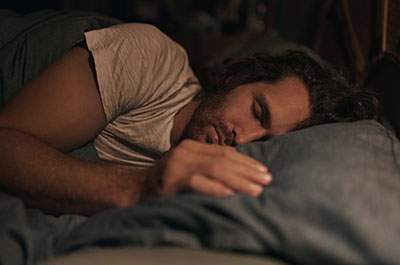You know that sleep is important for feeling alert and energized. But slumbering soundly isn’t only good for the brain. Lack of sleep can also harm your heart.
“Sleep is important for so many reasons—including heart health,” says Luisa Bazan, M.D., a sleep medicine specialist at Henry Ford Health. Dr. Bazan explains how skimping on ZZZs can affect your heart and how to get the healthy sleep you need.
How Sleep Affects Your Heart
Falling asleep feels like pressing the pause button on your day. But while you rest, your body is hard at work—repairing tissues, storing memories, releasing hormones, clearing away waste and more. Those processes are important for every body system, including gut health and preventing dementia.
Sleep also affects heart health, both directly and indirectly:
- High blood pressure: When you’re asleep, your blood pressure naturally drops. Frequently getting less than the recommended 7 to 9 hours of sleep may increase your risk of developing high blood pressure. And if you already have high blood pressure, lack of sleep can make it harder to control.
- Heart disease: Researchers have found an increased risk of heart disease in people who regularly get less than 7 hours of sleep per night.
- Inflammation: Too little sleep can increase inflammation throughout the body, Dr. Bazan explains. Chronic inflammation is linked to a range of diseases, including heart problems. Over the long term, inflammation can damage heart tissue and blood vessels, contribute to high blood pressure, and increase the risk of heart attack and stroke.
- Diabetes: “Lack of sleep is also linked to insulin resistance,” Dr. Bazan says. Insulin resistance happens when the body’s cells stop responding correctly to insulin, a hormone that regulates blood sugar levels. It can lead to Type 2 diabetes, which significantly increases the risk of heart disease.
- Obesity: During sleep, the body releases hormones that affect hunger and metabolism. Sleep deprivation can make you feel hungrier and make it harder to resist sweet treats and processed foods—and contribute to weight gain. Obesity, in turn, can lead to problems such as diabetes and heart disease.
- Mortality: Studies show that people who regularly get less than 6 hours of sleep each night have a significantly greater risk of dying than those who get at least 7 or 8 hours most nights.
Sleep Apnea and Heart Disease
Not spending enough time in bed is one obvious reason people are short on sleep. But sleep disorders can also interfere with healthy slumber and a healthy heart. One of the most common sleep disorders is sleep apnea, a condition in which the airways become blocked during sleep. People with sleep apnea briefly stop breathing, causing them to awaken for a few seconds—sometimes more than a dozen times each hour.
Sleep apnea interferes with deep, restorative sleep. Because it interrupts breathing, it can reduce the amount of oxygen reaching your body’s tissues. What’s more, waking off and on throughout the night can cause your blood pressure to spike and drop repeatedly. “Such factors increase the risk of problems like high blood pressure, heart attacks and strokes,” Dr. Bazan says.
Too Much Sleep

While sleep deprivation can cause problems, there’s also a link between health problems and getting too much sleep. People who regularly get more than 9 or 10 hours of sleep per night have an increased risk of diabetes, heart disease and death.
The reason for that connection isn’t fully understood, Dr. Bazan says. It’s possible that people who sleep more than the usual amount may already have underlying health problems that make them sleepier.
What is clear is that 7 to 9 hours of sleep each night seems to be the sweet spot for good health, she adds. If you are regularly getting more or less than that amount, or wake up feeling tired, talking to your doctor is a good idea.
Heart-Healthy Sleep Tips
One bad night of sleep is frustrating, but it probably won’t derail your health. But regularly shortchanging your sleep can start to affect your well-being.
Not getting the recommended 7 to 9 hours each night? Here’s what you can do.
- Put sleep on your to-do list: “We have so much going on in our lives, we often sacrifice sleep for all the rest,” Dr. Bazan says. “As much as you can, prioritize getting enough sleep.”
- Avoid electronics: Phones, tablets and other devices can interfere with restful slumber. Plan to power down at least an hour before bedtime. Try plugging in devices in a different room so you’re not tempted to scroll in bed.
- Limit substances: Caffeine and alcohol can both lead to tossing and turning. Try to avoid caffeine after midday, and practice moderation if you plan to drink alcohol.
- Set the mood: Make your bedroom an inviting place for sleep. Keep the room cool, dark and quiet.
- Ask for help: There are many reasons you might not be getting restful sleep, including medication side effects and sleep disorders. “If you’ve followed good sleep hygiene and still have trouble, a doctor can take a look to help you figure out what’s going on,” Dr. Bazan says. Making that investment will help your heart—and the rest of you.
Reviewed by Luisa Bazan, M.D., a sleep medicine specialist who sees patients at Henry Ford Medical Center - New Center One.



